Now is the time of monsters: A story about how we got dogs
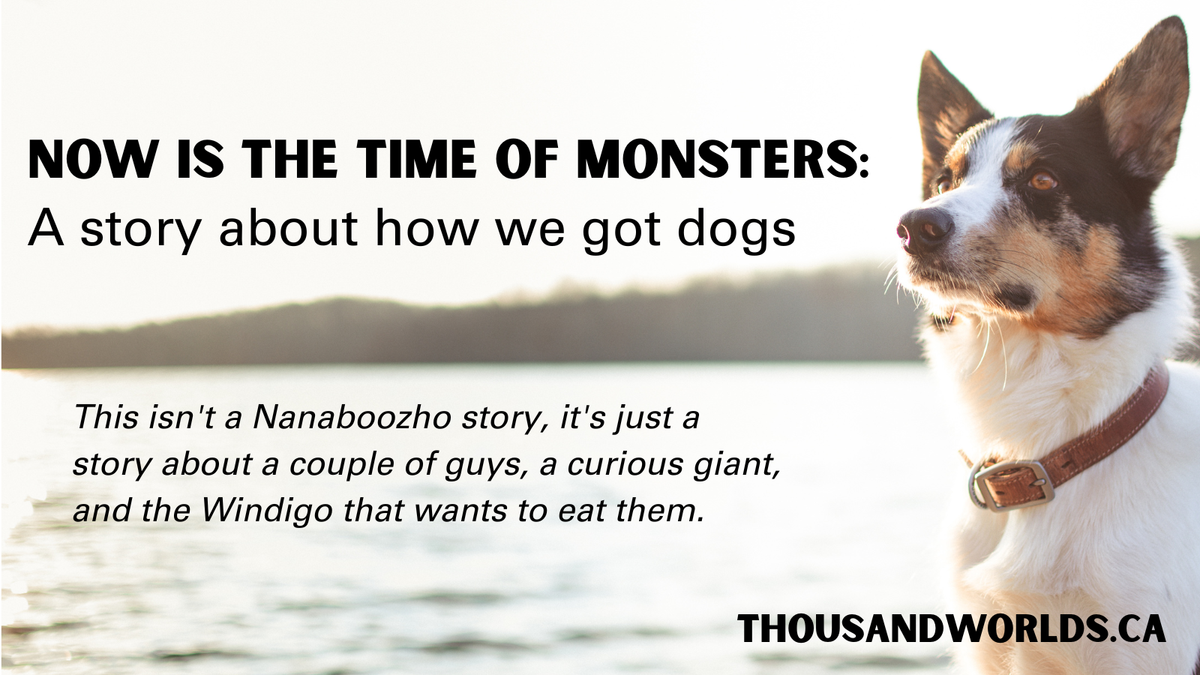
This year the Socialism conference took place over the July 4 weekend and at some point in the early spring, in the throws of unmerited hope I submitted a panel, reserved a hotel room (with lakeside views to watch fireworks), and paid for my registration. A month later I was asking if a couple of us in Canada could participate remotely because while I'm not concerned about being arrested in Canada for direct action, I don't want to wind up in ICE detention. The panel had to do with Indigenous storytelling and what it could teach us about confronting monsters, being a socialism conference we tied our presentations to Antonio Gramsci's quote:
The old world is dying, and the new world struggles to be born: now is the time of monsters.
That's about the extent of my knowledge of Gramsci, other than knowing that he was an Italian anarchist writing in the early 20th century. I threatened to read him one time and got the same response I got when I told my youngest that I should probably read Marx: don't do it. Read ABOUT them, but don't read them until you know more about their works because they're dense and can be hard to follow. It wasn't a hard sell. The Prison Notebooks, from where this quote comes, is about 2,000 pages. Selections from The Prison Notebooks, otoh, is a brief 580 pages. I did get a graphic novel version of Marx from this conference last year along with a philospher's tarot deck (Fanon as Justice?? yes!).
It's a banger of a quote and is basically everywhere right now because I'm not sure if you've noticed, but the modern world that was ushered in by the rise of nation-states about 400 years ago is in its death throes. If you read the most recent blogpost about Nanaboozho and the Evil Gambler then you pretty much know what I said in the panel. We don't yet know what world will emerge, but now is indeed the time of monsters and it turns out that Indigenous storytelling has a lot to teach us. This week's story is no exception even though I chose it because the title, The Origin of Dogs, seemed like a nice story. Like a bit of a vacation from all the heavy stuff we've been talking about.
It isn't a vacation at all. But dogs are awesome so we're going to keep with this story anyway. It isn't a Nanaboozho story, it's just a story about a couple of guys, a curious giant, and the Windigo that wants to eat them.
But first! We are grateful. So grateful to new members for signing up! Paid subscribers do help keep the lights on and the books coming in, but everyone can expand my audience by sharing this post through email or on social media.
This week's story about dogs comes from the William Jones archive. Patricia Ningewance, in Gii-Nitaa-Aadisooke, has a charming story about why dogs sniff each other's bums and there are several stories that include dogs, but we're just concerned with their origins today.
As always, these are just personal reflections, they are not meant to be seen as an authoritative statement on what these stories mean, as if there was a singular meaning. Which there isn't. I reflect on these stories to put them into conversation with your own, not to try and convert you to the religion of the Anishinaabe.
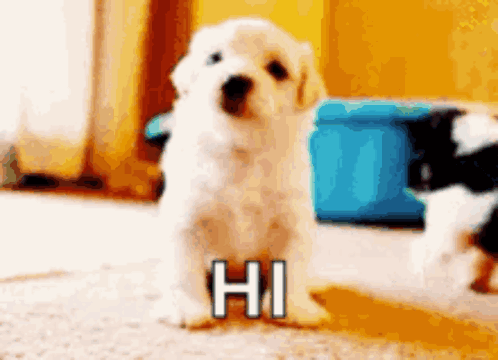
Once upon a time a couple of men were paddling along minding their own fishy business when they got blown so far off course that by the time they found land they had no idea where they were. It was getting dark, so they turned their canoe upside down and made camp for the night, but not before noticing some indentations in the ground that looked an awful lot like giant footprints.
THWAK. Or maybe THUD.
They peeped outside the canoe and saw a huge arrow. Like roadside-attraction huge. Before long a Giant fee-fie-fo-fummed his way into their campsite and said "don't be afraid little brothers" which is exactly what you would expect a being you definitely should be afraid of would say. "I am a Giant, but I don't destroy people." They were skeptical, seeing as he had a whole caribou labubu just hanging off his belt, but what are you going to do.
He picked them up, tucked them into his shirt, and went home.
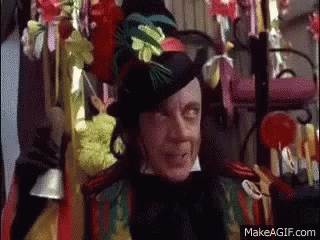
Before long the aforementioned monster barged in and said "I smell children." Or maybe it was "I smell humans." The Giant said absolutely not and they went back and forth for a while until the Giant had enough and got his dog named Hairless out from under the bowl where he kept him. The dog started shaking and with every shake got bigger.
"Up Hairless!" said the Giant. "Go fight this impious man," which is a truly odd way to describe a giant cannibal. Also, hairless is a strange name for a dog. Interestingly, the Xoloitzcuintle is a hairless Mexican dog that comes in small, medium, and large sizes. It's name is in the Nahuatl language and comes from the god Xolotl and the word for dog so who knows. We got corn (maize) from the Nahuatl people, maybe we got dogs too via their god Xolotl. Maybe that's the giant's name, I have no idea.
The giant cannibal knows when he's done so he high-tailed it out of the house with Hairless in hot pursuit. Hairless fought the monster until he killed him and then came back in, shaking himself until he was back to normal size and returned under his bowl.
The Giant slapped his knees and stood up the way old people do when you've overstayed your welcome. "Well, I brought you here so I could see you and now that I've seen you it's time to go. I'm going to give you this little pet of mine because you don't have any dogs where you come from and he might come in handy." Then he let Hairless out from under the bowl again and told him to take them home. Hairless grew again and the Giant put the men onto the dog's back. Go straight home now, you hear? And off they went.
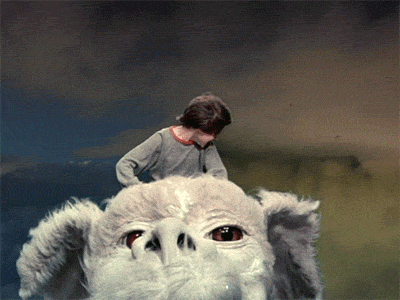
The more the dog ran the bigger he got and pretty soon he was running through the lake like it was a puddle. By the time they got home he was back down to a normal size. He went off exploring, but he came back and that's just how dogs are. All the dogs on earth are descended from Hairless. And since he was the only one he must have mated with wolves and that's probably why our dogs aren't hairless which is good because winters here get very cold.
This really is kind of a cute story. A couple of guys out fishing get lost, kidnapped by a curious Giant, saved from the cannibal nobody invited for dinner, and sent home with a puppy. So let's look beyond the cute to see what's in this story that we can put in our own pockets.
I don't know what world this story takes place in. It could be the world we're familiar with, it could be the spirit world where spirit things happen. Maybe both. Maybe that's where the men got blown off course to.
This story is about something new that came into our lives and that often happens when something from spirit world comes into our own world so it is possible that we've got a couple of quantum leapers traveling between worlds. Not sure how I feel about Wetikos being in that other world, but the Giant seems to have handled it easily and for all I know the only reason they are in this world is because they already existed that world and we're the ones who called them here.
The story that Basil Johnson tells about the first of these monsters stems from a man and his family who were starving. The man, in desperation, went to see a sorcerer who gave him a tea, which he took home and drank then instead of seeing people the man saw beavers and in his hunger he ate them all. Then he went to a village and ate them too. Maybe the tea created a link between our worlds and when the man took that first bite it completed the spell and brought the monster here, which is very HP Lovecraft by the way, the emergence of monsters from some kind of primordial chaos into our current world. Why the sorcerer wanted this to happen I have no idea.
So if that's the case, then this story offers balance by way of the incredible growing dog. And you'll recall that the Ojibwe, like many peoples around the world, are very concerned with seeking balance.
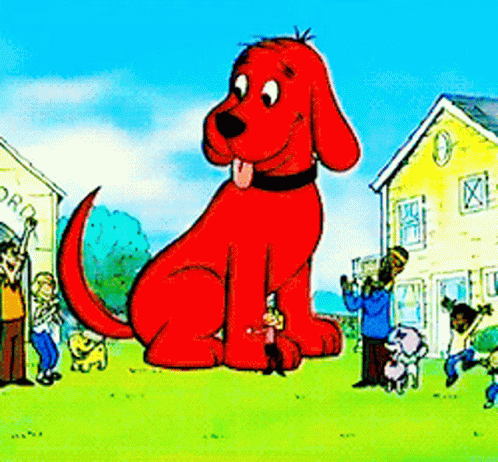
I want to think about the ways that we call things into being, what it means to live in a world that layers with other worlds, and how we can work towards justice and balance. I don't want to think about this story as a metaphor, the elements deserve to be taken seriously and understood as real on their own terms. Which doesn't mean it is history either, but it is a story that we can learn from.
Like many land-based people, the Ojibwe have a number of prohibitions around the things we say for good reason. There are some stories you don't tell unless there is snow on the ground, we add "ba" or "ban" to the names of those who have passed, maybe not even saying their names at all until they've been gone for a year, maybe longer. Not just as a way of letting their spirits go, but also holding their memories close by talking around them, as Louise Erdrich writes in the afterword to Books and Islands in Ojibwe Country. We talk around them, sharing memories and the connections that this person had with others. In that way, holding them even closer than their name.
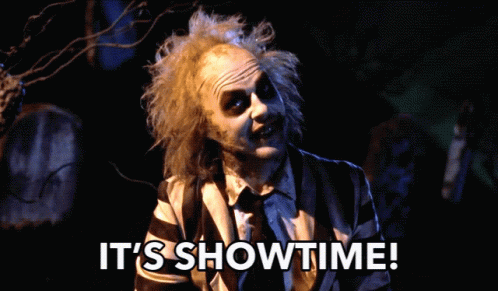
That's why I'm not saying the monster's name over and over again. Our words, and even our thoughts have the power to create and call forth and there are some beings that it is better not to call forth. This isn't the silence of secrecy that hides harms and abuses. And it isn't the silence of complicity or just pretending that bad things haven't happened. If anything, it is a silence that acknowledges danger. It is, in that way, another kind of talking around something while sharing the stories we need to know. On social media people have taken to using slang or wildcards to get around algorithmic censors, writing things like "unalived," "Isra**l," or "H*m*s." Everybody knows what is being talked about, but the censors don't pick it up. Eventually they learn and adapt, monsters are smart like that, but people develop new strategies.
We can laugh at this story, at the prohibitions and the notion that our words call things into being but if the things we say don't create things then why bother writing at all? Why ban books or create a canon of authoritative writing? Our words have power to create and to tear down, and it was in a moment of anger about the erasure of trans people that I realized my own words could become part of that. My own thinking has long been shaped and challenged by those that I read, and that afternoon it occurred to me that I could be one of those doing the shaping and challenging. Not just by what I yell about on social media, although that is part of it, by through more disciplined and intentional writing: my books, my blog, various articles.
For good or ill, our words call forth action, create movement.
"Witching is a practice of engaging the essential, natural world with magic and supernatural intentions."
Fables and Spells, adrienne maree brown
I want to think now about the fishermen and their journey to a spirit world, because that is what ceremony is. We engage with the essential, natural world with magic and supernatural intentions and open ourselves up. Our spirit travels to the place where it learns the things it needs to know and it brings that knowledge back with it. Now, clearly we can call forth imbalance and harm as well as balance and healing. Intention matters, what we want to call forth and why. Ceremony can be difficult, pushing the edges of what our bodies and spirits can tolerate, and I was taught that when we get to those edges our spirit will travel to where it can learn and then be called back. This is why it is so important for ceremony to be lead by responsible people that you can trust.
We could look at the two stories as examples of responsible and irresponsible use of intention and ceremony. In response to hunger the two men went fishing while the man went to a sorcerer. People go to spiritual leaders all the time for advice, for doctoring, for medicine. There are some you can trust, and others you should not. Clearly this man went to one that he should not have trusted, desperation often leads us to reckless choices that do more harm than good. Did the man have nobody left that he could turn to for support? We need to think about that in our own communities, what kind of desperation are people driven to because they simply have no other resources. And what are they calling into our communities through that desperation?
It makes me think about the ways impoverished and under-resourced communities are forced to rely on cops and child welfare workers for basic needs like groceries because there simply isn't anyone else that can help them. Food banks and soup kitchens are under funded, housing is too expensive, medical care is not accessible and the only agencies that have money are mandated agencies like policing and child welfare. The trouble with relying on these agencies is that you are giving them access to your community and your family, access that they use to surveil and gather information. That is intentional, when I worked for child welfare and a family refused to meet with me the supervisors often authorized the purchase of groceries or the offer of a gift card to bribe my way in, desperation leading people to call in the monsters that consume our communities. We open portals, and we can't always control what comes through.
In the other story, the two men went fishing. We don't get much information about them, I am presuming that they, or somebody they knew, were hungry because otherwise why did they go fishing? I know people who go hunting to meet community needs if not their own, even if they have enough they know that others do not so they go fishing or hunting and share what they bring back. We know they decided to camp for the night, and that they were alarmed by the giant who walked into their campsite, a completely reasonable reaction. Spirit should be taken seriously.
The introduction of this particular monster into the story intrigued me, that's what made me think that the gift of the dog was a rebalancing, a response to what the other man had called into our world by offering us something that demonstrated its ability to confront that particular evil. This is what ceremony does, we open ourselves to spirit and we receive what we need to confront the things that need confronting. That feels deeply important now as old worlds are ending and new worlds are being born. We do indeed live in a time of monsters and we need the gifts that ceremony offers to help us with rebalancing and recalibrating .
I don't know what ceremonies are part of your life or your history. I do know that there are a lot of ways we engage with the essential, natural world with magic and supernatural intentions even if we don't always understand it that way or use that kind of language. I know that we do this alone and in groups. I know that we bring varied intentions into that engagement. And I know that dogs will tell you if something or someone isn't right.
PS. If you're curious about why dogs are always sniffing each other's bums, according to Patricia Ningewance, it's because they left their bums outside at a party and when the cats crashed it they panicked and took off, just grabbing whatever bum they could find, which got them all mixed up. So the dogs are just trying to find their own bums.
And now the ruffed grouse is hung by the door.

Excerpt from Katie's review on Goodreads: "I feel that a lot of colonized minds are dismissive of Indigenous worldviews because they haven't taken the time to really let simple truths simply put sink in. Like I said, the medicine is in the margins in this one. Don't miss 'em."
Preorder your copy of Bad Indians Book Club today in the US at Bookshop.org, Amazon, Barnes and Noble, and in Canada: Indigenous owned GoodMinds, as well as Amazon, indie books, and Chapters Indigo. Get it wherever you get your books.
And if you want me to zoom into your local bookstore or bookclub? Talk with you on your podcast? I can do that.
Fables and Spells by adrienne maree brown is a collection of poetry and short stories that I come back to over and over again. The fables are mostly futuristic or speculative, offering us other ways to think about the world we are in and what may yet be.
White Magic by Elissa Washuta (Cowlitz Indian) is a memoir in the form of a collection of essays that travels through the spiritual, the real and the cheap fascimiles, as she writes about land, heartbreak, and colonization. It is the stuff of trauma and rebuilding, and the ways that we connect with spirit while we do that.
Antelope Woman by Louise Erdrich is an updated version of a previous story, the Antelope wife, after she decided to focus on Sweetheart Calico as her own person rather than as somebody's wife. Like all of Erdrich's writing, it is infused with magic and mystery, a woman who is descended from antelopes and the entwined histories of two families.
Vine Deloria's The World We Used to Live In documents the stories about medicine men and women across the US, the extraordinary things they did as part of their ordinary lives. So often our spiritually powerful people are presented as belonging to some distant unreachable past. Deloria's book demonstrates that they are not that far away, that their knowledge of the natural world was vast, and that we can live that way again.
And don't forget to join up with the Nii'kinaaganaa Foundation. Every month we collect funds from people living on Indigenous land and redistribute them to Indigenous people and organzers. You can find out more information on the website which is now powered by ghost, which means that you can become a subscriber there just like you are here! This month in addition to the organizers we support we are trying to keep 4 people from being evicted by covering their rental arrears. Please help if you can.

